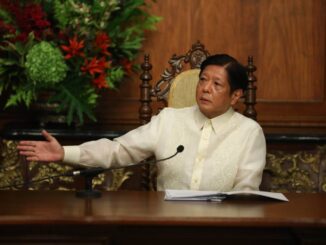
THE turnover of death row convict Mary Jane Veloso from Indonesia to the Philippines was one of the significant achievements of the Department of Foreign Affairs (DFA) in 2024.
Foreign Affairs Secretary Enrique Manalo said Veloso’s return was a “significant achievement” for the bilateral relations between Manila and Jakarta.
He lauded the Department of Justice, which worked closely with the DFA and then-Philippine Ambassador to Indonesia Gina Jamoralin and her team, for planning Veloso’s repatriation.
Veloso, a Filipina house help, was convicted of drug trafficking after customs officials in Yogyakarta airport found 2 kilos of heroin stashed in her luggage.
She was due for execution through firing squad along with eight other foreigners in April 2015 but got a last-minute reprieve to allow her to testify against a “perpetrator suspected of human trafficking.”
Veloso has maintained that an international human trafficking and drug gang tricked her into bringing 2.6 kilograms of heroin to Indonesia from Malaysia five years ago.
She won an 11th-hour stay of execution after Maria Kristina Sergio, the person suspected of asking her to carry the drugs, turned herself in to Philippine authorities.
OFW convicted overseas worker Mary Jane Veloso arrives at the Bureau of Women’s Correctional in Mandaluyong City just in time for Christsmas join by their two son Daniel and Darren, Indonesian Government gave Veloso only a “Temporary Reprieve” from her schedules execution in relation to alleged human trafficking. PHOTO BY MIKE DE JUAN
In January 2024, Manalo reiterated the Philippines’ request for Indonesia to grant clemency to Veloso.
He made the appeal at the sidelines of his meeting with visiting Indonesian Foreign Minister Retno Marsudi.
They co-chaired the Ministerial Meeting of the 7th Philippines-Indonesia Joint Commission for Bilateral Cooperation (JCBC). Manalo discussed Veloso’s case with Retno during the JCBC.
The JCBC is the primary dialogue mechanism between the Philippines and Indonesia to review accomplishments on mutual collaboration initiatives, exchange views on issues of mutual interest, and consider plans for enhancing cooperation.
Asserting sovereignty
The DFA, just like in previous years, continued to assert and promote the Philippines’ rights and interests in the West Philippine Sea (WPS) amid China’s aggressive and dangerous actions against Philippine vessels in the area.
Manalo and other Filipino diplomats asserted in various international fora, the Philippines’ adherence to the rule of law, particularly the United Nations Convention on the Law of the Sea (Unclos), and in resolving overlapping claims in the South China Sea through dialogue or peaceful means.
The DFA said that under the Marcos administration, the Philippines filed 193 protests against China’s bullying of Philippine vessels from July 1, 2022, to Dec. 5, 2024.
This figure included the protest filed on Dec. 5 following the harassment of BRP Datu Pagbuaya by the China Coast Guard (CCG) while on routine patrol near Bajo de Masinloc. The CCG allegedly fired a water cannon at BRP Pagbuaya.
For the first time, the Philippines had been invited to participate in the G7 summit in Italy.
Manalo said the Philippines “appreciates the G7’s unwavering commitment to a free and open Indo-Pacific region as well as to Asean centrality and unity.”
“The state of the Indo-Pacific concerns us all. That’s why at the G7 foreign ministers meeting, I conveyed the Philippines’ views on Indo-Pacific/South China Sea issues and the situation our people face in the West Philippine Sea,” Manalo earlier wrote on X (formerly Twitter).
“I thank the G7 for their support for the Philippines’ principled position that bolstering a maritime order in the SCS, anchored on Unclos, is critically important to maintaining the rules-based order in the Indo-Pacific,” Manalo said.
Ambassador Antonio Lagdameo on Dec. 10 delivered a strong statement before the United Nations General Assembly (UNGA) in New York asserting Philippine sovereignty over Bajo de Masinloc or Scarborough Shoal.
“Bajo de Masinloc has always been an integral part of the territory of the Philippines,” said Lagdameo, the Philippine Permanent Representative to the UN.
He made the statement during the UNGA’s debate on “Oceans and Law of the Sea,” the annual plenary agenda item that considers developments pertaining to the Unclos, as well as those relating to ocean affairs and the law of the sea.
“Only the Philippines, in the exercise of its sovereignty, has the right to establish baselines, and the breadth of the territorial sea around Bajo de Masinloc, in line with the United Nations Convention on the Law of the Sea,” he said.





Be the first to comment